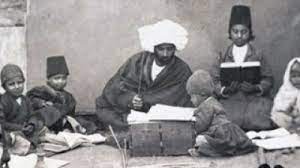
Quranic Education
This is all about learning and understanding the Quran, the holy book of Islam. It’s a big part of Muslim life and culture and is seen as important for spiritual growth and development. The goal is to become knowledgeable about the teachings and messages in the Quran, which cover a wide range of topics, from ethics and morality to guidance on how to live a good life. It’s typically taught in religious schools, madrasahs, or at home by parents or teachers. Learning the Quran involves memorizing passages, understanding their meaning, and applying the lessons to daily life. It’s not just about rote memorization, but internalizing the teachings and making them a part of one’s own beliefs and values.Challenges Facing The Quranic And Islamiyya Education In Nigeria
Read Also: 10 CHALLENGES FACING UNIVERSITY EDUCATION IN NIGERIA
👉 Relocate to Canada Today!
Live, Study and Work in Canada. No Payment is Required! Hurry Now click here to Apply >> Immigrate to CanadaIslamiyya Education
This refers to Islamic religious education, Islamic Education System is a divinely revealed system of education that prepared individuals to be upright on earth and attain happiness in this life and in the
hereafter. Education in Islam is regarded as a process that completely nurtures the individual, aimed at the balanced growth of the total personality of human beings through the training of man‟s spirit, intellect, rational self, feelings, and bodily senses. Islamic Education is the best system of education which makes an ethnically groomed person all the qualities which he/she should have as a human being which aims to impart knowledge and understanding of the Islamic faith to students. It covers a wide range of subjects, including the Quran, Hadith (the sayings and actions of the Prophet Muhammad), Fiqh (Islamic jurisprudence), and Seerah (the biography of the Prophet Muhammad). The curriculum is designed to provide students with a strong foundation in the beliefs and practices of Islam, as well as to instill moral and ethical values. This type of education is typically offered in Islamic schools, madrasahs, or at home and is considered essential for the spiritual growth and development of Muslim children. The goal of Islamiyya education is to produce well-rounded individuals who are knowledgeable and committed to their faith, and who can live according to its principles in the modern world.
Relationship Between Quranic And Islamiyya Education In Nigeria
In Nigeria, Quranic and Islamiyya education are closely related, as they both aim to provide students with a strong foundation in the Islamic faith. Quranic education focuses primarily on the study and understanding of the Quran, while Islamiyya education includes a broader range of subjects, including the Quran, Hadith, Fiqh, and Seerah. Together, these two forms of education work to provide students with a comprehensive understanding of the Islamic faith, its teachings, and its impact on daily life. NYSC Portal
Quranic education is often seen as a foundation for Islamiyya education, as a strong understanding of the Quran is considered essential for students to fully grasp the wider subject matter. Islamiyya education builds upon this foundation by exploring the Prophet Muhammad’s life, the development of Islamic law, and the moral and ethical principles of the faith.
The relationship between Quranic and Islamiyya education in Nigeria is important, as it helps to ensure that students receive a well-rounded education that prepares them not only for academic success but also for a life guided by their faith. It also helps to foster a strong sense of community and cultural identity among Muslims in Nigeria, by providing them with a shared understanding of their beliefs and practices.Information Guide Nigeria
Read Also: 10 Current Challenges Of Nigeria
Overview Of Quranic And Islamiyya Education In Nigeria
Quranic and Islamiyya education are essential parts of the educational landscape in Nigeria. Quranic education is focused on the study of the Quran and its teachings and is often taught in religious schools, madrasahs, or at home. The goal is to enable students to understand the Quran and apply its teachings to their daily lives.
Islamiyya education is a more comprehensive form of religious education that covers a range of subjects, including the Quran, Hadith, Fiqh, and Seerah. It aims to provide students with a thorough understanding of the Islamic faith, its beliefs and practices, and its impact on daily life. Islamiyya education is often taught in Islamic schools, madrasahs, or at home, and is considered essential for the spiritual growth and development of Muslim children. JAMB Portal
👉 Relocate to Canada Today!
Live, Study and Work in Canada. No Payment is Required! Hurry Now click here to Apply >> Immigrate to CanadaIn Nigeria, Quranic and Islamiyya education plays an important role in fostering a strong sense of community and cultural identity among Muslims. Despite the challenges facing the system, such as a lack of qualified teachers and inadequate funding, these forms of education remain popular and widely available. With a commitment to improving the quality and relevance of Quranic and Islamiyya education, Nigeria can ensure that its Muslim communities continue to thrive and prosper.
Challenges Facing The Quranic And Islamiyya Education In Nigeria
-
Lack Of Qualified Teachers
There is a shortage of qualified and trained teachers to impart Quranic and Islamiyya education, which can lead to a lack of quality instruction.Duties of an Accountant
-
Funding
Many religious schools struggle to secure adequate funding, which can impact their ability to provide quality education, purchase materials, and equipment, and attract qualified teachers.
Read Also: 10 Challenges Facing Jumia
-
Poor Infrastructure
Many religious schools in Nigeria lack proper infrastructure, such as adequate classrooms, libraries, and laboratory facilities.
-
Outdated Curriculum
The curriculum for Quranic and Islamiyya education is often outdated and does not reflect the changing needs of society. Good Morning Love Message
-
Limited Access
Not all children have access to Quranic and Islamiyya education, especially those living in rural areas or disadvantaged communities.
Read Also: 10 CHALLENGES FACING NIGERIAN POLICE FORCE
-
Competition With Secular Education
Quranic and Islamiyya education often competes with secular education for students and resources, which can lead to a decline in enrollment.
-
Lack Of Standardized Evaluation
There is a lack of organized evaluation methods to assess student performance and the quality of Quranic and Islamiyya education.Duties of an Aerospace Engineer
-
Limited Integration With Mainstream Education
Quranic and Islamiyya education is often separate from mainstream education, which can limit opportunities for students to integrate their religious and secular knowledge.
-
Religious Extremism
There are concerns about the potential for religious extremism to be taught in Quranic and Islamiyya schools.
-
Resistance To Change
There is often resistance to change within the Quranic and Islamiyya education system, which can limit efforts to improve and modernize the curriculum and teaching methods. Romantic Love Messages
Read Also: 10 CHALLENGES OF LEADERSHIP IN AFRICA
Conclusion
The challenges facing Quranic and Islamiyya education in Nigeria are significant and wide-ranging. From a shortage of qualified teachers and inadequate funding to limited access and outdated curricula, the system is facing many challenges that must be addressed if it is to provide quality education to students. However, with increased attention and resources, as well as a commitment to modernizing and improving the system, it is possible to overcome these challenges and ensure that Quranic and Islamiyya education remains relevant and effective for future generations. Improving the quality of education in this sector will not only benefit students but also contribute to the development of a more educated and harmonious society in Nigeria.
Check JAMB RESULT
Check and Confirm: How much is Dollar to Naira







